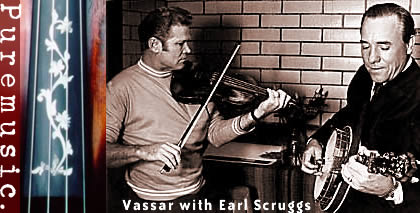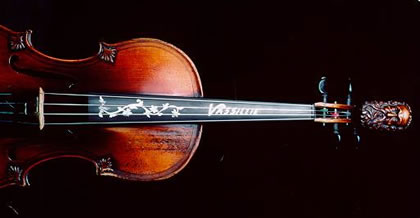
A Conversation with Vassar Clements (continued)
PM: I've read some of the history of that amazing fiddle that you play, but since some of our readers may not delve into it, maybe give us a little bit about the story of that fiddle in your own words. What's known about that?
VC: There's not a whole lot known about it. We're pretty sure it was made by a guy by the name of Gaspar Duiffoprugcar in the 1500s. And from the part of the history that I can get, which is very little, he was known for making the first violin. And I'm not sure, but I think he used to make lutes, and he got this idea of making a violin. Now, if I've got it right, I have; if I don't, somebody can correct me. But the ones he made were a little bit larger than a violin is now, today. And he wouldn't sell one. He would make it and give it to somebody who was playing in big events like the Queen's Ball or something like that. Or that's what I heard, that back in those days he never sold them. He would give them to these people.
And the way I got mine was through John Hartford. John said, "You take it, Clem." And I said, "Well, let me pay you for it," because he bought it from George Gruhn at the Bean Blossom Festival years ago, in the 70s. And I said, "I'll pay you back when I get to Nashville." It didn't have a thing on the fiddle, not even the fingerboard or the tail piece or nothing, no strings, no pegs. But it had that nice carved head on there. And I said, "I'll hang it up on a nail and let people that come through the house see it."
Then I got to thinking I wanted more people to see that, if I could get a sound out of it. And I got all the pegs and tail piece and everything and strung it up and worked on that thing for a couple months, trying to get the sound post in the right place because it would sound like it would be off in a barrel somewhere. And I thought the sound was in there because the wood looked old to me. I said, "Any piece of wood that's good has got to have a sound there somewhere." And I finally lucked out one day. I was about forty years old. I noticed my eyesight started going while I was sitting at that sliding glass door trying to move that sound post. So I had to be forty. And then I got it strung back up, and that was the sweet spot.
PM: That must have been an exciting day when you got the sound post in the right place.
VC: Oh, it was. I'll tell you what, I couldn't put it down, and I've been playing it ever since.

PM: And the sound post is not glued, it's just positioned?
VC: It's just positioned, yeah. You can move it around just a little bit, just a little bit, and it'll change the tone. It just took a long time to find the right place for the tone. And then it needed playing on, of course. I've played on it ever since, and the more you play it, the better it sounds.
PM: And John never would take any money for it?
VC: Never did. And I remember Acuff had it at one time, before Gruhn ever got a hold of it. Roy Acuff had it in an exhibit of old instruments and stuff out at Opryland, the old Opryland. And I remember, we were playing a show together, and my wife and him was standing at the edge of the stage on the ground. She said, "Roy, do you ever regret getting rid of that fiddle?" And he was looking with his arms folded and he said, "Only when he plays it."
[laughter]
VC: And I thought that was a good comment, that nobody thought the fiddle would sound good. People had tried it, and it didn't sound good. And Hartford, until his last day, he said that fiddle was just made for me, and nobody else could do anything with it. When Hartford had something in his mind, that's the way he'd keep it.
PM: Right.
VC: And that's what he said. He said, "That's yours."
PM: Wow. And there's another golden personality. What an amazing bunch of people you've known.
VC: Oh, yeah. It's mind boggling. I couldn't even put the names down, there's just so many.
PM: And do you know John's son, Jamie, well?
VC: Oh, yeah.
PM: He's another great player.
VC: Yeah, he is. Me and him used to sit around all the time. And John would tell me to help him because he wouldn't listen to John. So he'd come over to the house, and we'd practice. And he'd let me show him stuff. He wanted to play with me, he wanted to practice with me. I got along with kids real good anyway. And you know how kids are, they don't want to listen to their parents as much as they do somebody else.
PM: It doesn't matter who their parents are.
VC: I know.
[laughter]
PM: Doesn't matter if they're Stradivarius.
VC: That's right. It don't matter who. "Dad, I ain't going to listen to you. I'm going to go over here and play with this guy."
[laughter]
PM: Oh, it's so true. continue
print (pdf) listen to clips puremusic home